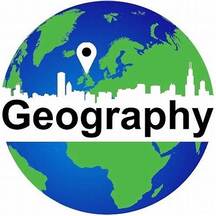Geography
Geography

WHY STUDY GEOGRAPHY?
The study of Geography provides students with the opportunity to understand the world around them, through the exploration of the physical properties of the Earth’s surface and the human societies spread across it.
Geography strives to understand where things are found, why they are there and how they develop and change over time. As a department, we aim to inspire and provide pupils with transferable skills and experiences that will benefit them throughout their school career and beyond.
The study of Geography provides students with the opportunity to understand the world around them, through the exploration of the physical properties of the Earth’s surface and the human societies spread across it.
Geography strives to understand where things are found, why they are there and how they develop and change over time. As a department, we aim to inspire and provide pupils with transferable skills and experiences that will benefit them throughout their school career and beyond.
|
Geographers are considered the most employable people in the world, overall highlighting the importance and benefits of studying Geography!
Careers and employability skills can be found at the following links: |
Watch the Geography Promo Video
|
NATIONAL 4/5 GEOGRAPHY
During National 4/5 Geography, students study a variety of topics that circulate around three main areas. The Physical Environments section allows students to explore the Earth’s natural features and properties by investigating Coastal landscapes, Glacial landscapes and Weather. The Human Environments section further develops students’ knowledge and understanding of society and cultures that exist across the globe through study of the following topics: Urban, Rural and Population. The third section - Global Issues - presents students the opportunity to engage with current world problems by studying causes, solutions and impacts of both Climate Change and Health (HIV, Malaria and Heart Disease).
Furthermore, National students travel to Arran for a day to complete fieldwork relating to glaciation, which can then be used for the basis of their assignment.
HIGHER GEOGRAPHY
Following on from National 5 Geography, the Higher curriculum continues to mirror the same format of the three main curricular areas: Physical Environments, Human Environments and Global Issues. Within the Physical Environments section, students investigate three new topics – Biosphere, Atmosphere and Hydrosphere – whilst building knowledge and understanding on previous topic, Lithosphere. Students also continue building knowledge within the Human Environments section of the course, by continuing to study Urban, Rural and Population in greater depth. The Global Issues section of the course introduces students to the new topic of River Basin Management, whilst building on existing content in relation to Health.
Moreover, Higher students conduct a local fieldwork study in Troon town centre to collect data for their Higher assignment.
For more information on Higher Geography visit: https://www.sqa.org.uk/sqa/47922.html
ADVANCED HIGHER GEOGRAPHY
Advanced Higher Geography builds upon content and skills developed at Higher while allowing students to develop skills of independent study and research with an emphasis on personalisation of study areas and fieldwork. Students develop skills of communication, critical thinking, fieldwork techniques, data analysis, data presentation and map skills.
The course consists of a two-part folio worth 70% of the overall course.
Section 1: Geographical Study
Students select a theme and area of study which they are interested in and investigate it using a variety of fieldwork techniques and statistical analysis. Students present their findings as part of a larger folio.
Section 2: Geographical Issues
Students develop their critical thinking skills by selecting a topical issue and then evaluating a number of sources relevant to this theme.
For more information on Advanced Higher Geography visit: https://www.sqa.org.uk/sqa/48465.html
During National 4/5 Geography, students study a variety of topics that circulate around three main areas. The Physical Environments section allows students to explore the Earth’s natural features and properties by investigating Coastal landscapes, Glacial landscapes and Weather. The Human Environments section further develops students’ knowledge and understanding of society and cultures that exist across the globe through study of the following topics: Urban, Rural and Population. The third section - Global Issues - presents students the opportunity to engage with current world problems by studying causes, solutions and impacts of both Climate Change and Health (HIV, Malaria and Heart Disease).
Furthermore, National students travel to Arran for a day to complete fieldwork relating to glaciation, which can then be used for the basis of their assignment.
- For more information on National 4 Geography visit: https://www.sqa.org.uk/sqa/45705.html
- For more information on National 5 Geography visit: https://www.sqa.org.uk/sqa/45706.html
HIGHER GEOGRAPHY
Following on from National 5 Geography, the Higher curriculum continues to mirror the same format of the three main curricular areas: Physical Environments, Human Environments and Global Issues. Within the Physical Environments section, students investigate three new topics – Biosphere, Atmosphere and Hydrosphere – whilst building knowledge and understanding on previous topic, Lithosphere. Students also continue building knowledge within the Human Environments section of the course, by continuing to study Urban, Rural and Population in greater depth. The Global Issues section of the course introduces students to the new topic of River Basin Management, whilst building on existing content in relation to Health.
Moreover, Higher students conduct a local fieldwork study in Troon town centre to collect data for their Higher assignment.
For more information on Higher Geography visit: https://www.sqa.org.uk/sqa/47922.html
ADVANCED HIGHER GEOGRAPHY
Advanced Higher Geography builds upon content and skills developed at Higher while allowing students to develop skills of independent study and research with an emphasis on personalisation of study areas and fieldwork. Students develop skills of communication, critical thinking, fieldwork techniques, data analysis, data presentation and map skills.
The course consists of a two-part folio worth 70% of the overall course.
Section 1: Geographical Study
Students select a theme and area of study which they are interested in and investigate it using a variety of fieldwork techniques and statistical analysis. Students present their findings as part of a larger folio.
Section 2: Geographical Issues
Students develop their critical thinking skills by selecting a topical issue and then evaluating a number of sources relevant to this theme.
For more information on Advanced Higher Geography visit: https://www.sqa.org.uk/sqa/48465.html











